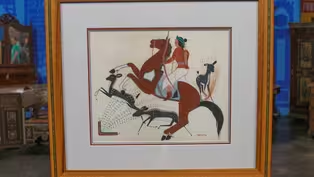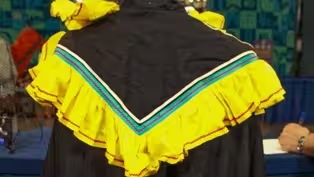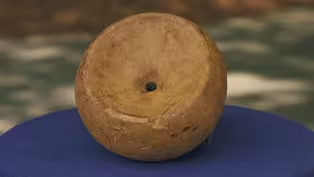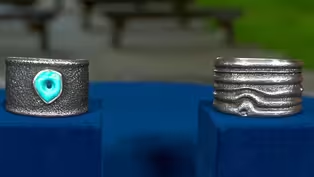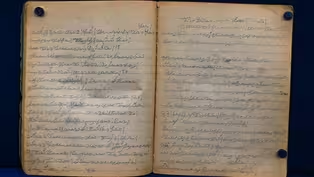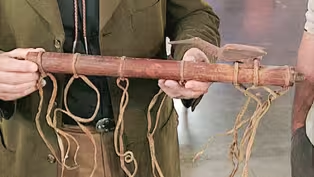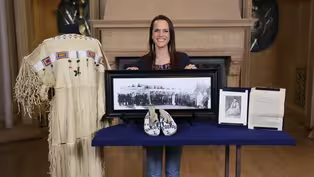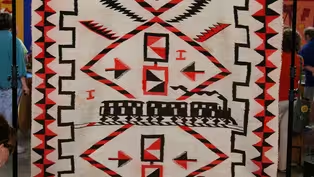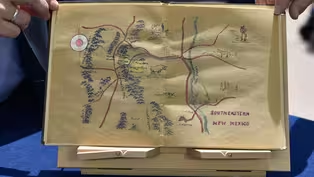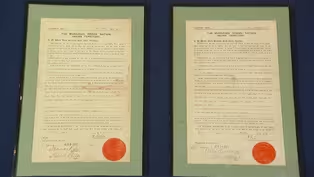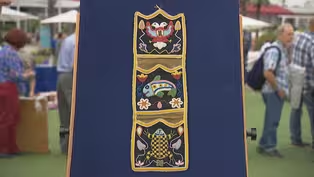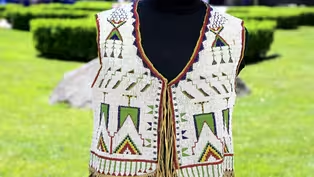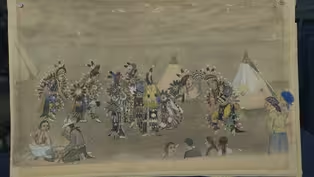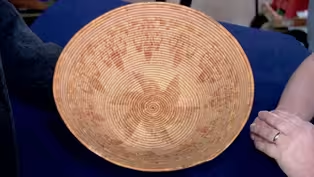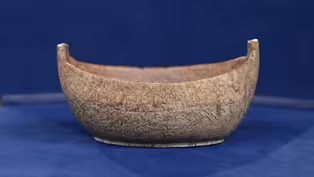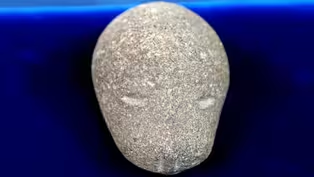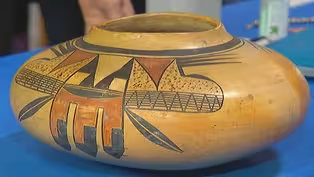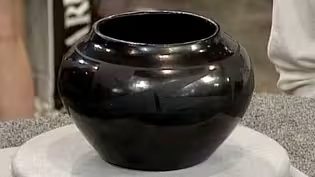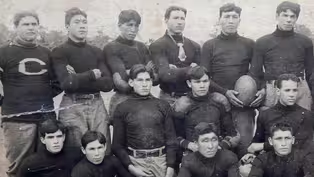
Appraisal: 1933 Jim Thorpe Handwritten Letter
Clip: Season 28 Episode 23 | 4m 35sVideo has Closed Captions
Appraisal: 1933 Jim Thorpe Handwritten Letter
In Celebrating Native American Heritage, Leila Dunbar appraises a 1933 Jim Thorpe handwritten letter.
Problems playing video? | Closed Captioning Feedback
Problems playing video? | Closed Captioning Feedback
Funding for ANTIQUES ROADSHOW is provided by Ancestry and American Cruise Lines. Additional funding is provided by public television viewers.

Appraisal: 1933 Jim Thorpe Handwritten Letter
Clip: Season 28 Episode 23 | 4m 35sVideo has Closed Captions
In Celebrating Native American Heritage, Leila Dunbar appraises a 1933 Jim Thorpe handwritten letter.
Problems playing video? | Closed Captioning Feedback
How to Watch Antiques Roadshow
Antiques Roadshow is available to stream on pbs.org and the free PBS App, available on iPhone, Apple TV, Android TV, Android smartphones, Amazon Fire TV, Amazon Fire Tablet, Roku, Samsung Smart TV, and Vizio.
Buy Now

ANTIQUES ROADSHOW's 2026 Production Tour
Enter now for a chance to win a pair of free tickets to one of the three stops on ANTIQUES ROADSHOW's 2026 Tour. Sweepstakes entry deadline is April 6.Providing Support for PBS.org
Learn Moreabout PBS online sponsorshipAPPRAISER: You brought us this great letter dated July 20, 1933, from one of the greatest athletes of all time, the legendary Jim Thorpe.
1933-- I'm assuming he didn't send it to you, so how did you get it?
(laughs) GUEST: (laughing) We do have good genes in the family, but not that good.
My grandparents lived next door to Jim Thorpe in Hawthorne, California.
It was pretty much agricultural area there, and they raised dogs, and my grandfather took care of Jim Thorpe's dogs when Jim was out touring, whatever he did in those years.
He wrote back quite a few letters to see how the dogs were doing.
He was always, uh, playing tricks on the kids.
My mom tells a story.
He came outside and asked 'em if they wanted some chocolate, and gave 'em a handful of chocolate, and they ate it, and he was just laughing uproariously, and said that it was, uh, chocolate Ex-Lax.
(both laugh) So... (shudders) APPRAISER: Maybe you don't want to eat dinner over there, I guess!
So what did you find fascinating about this particular letter?
GUEST: Well, I like that his dog was named Geronimo.
APPRAISER(laughs): That's right.
GUEST: I mean, it's perfect.
APPRAISER: We see right here.
He asks, "I'm glad to know that all the dogs are going good-- how is Jeronomo doing?
Can he still run, or has the old hurt bothered him?"
But he also mentions here that he's being owed money.
GUEST: Yes, yes.
APPRAISER: And he's waiting for that.
GUEST: To get paid.
My mom did say that it seemed like when she was growing up that they did live hand to mouth.
APPRAISER: And that to me is what gives this letter its poignancy, is that here you have Jim Thorpe, who in 1912 won the Olympic decathlon and the Olympic pentathlon and was called by King Gustav V at the time, "You are the greatest athlete in the world."
And Thorpe went on to play professional football, professional baseball, was known as one of the greatest football players of all time, was inducted into the first football class of a hall of fame.
GUEST: I didn't know that.
APPRAISER: But what, unfortunately, what has happened, and it's happened to athletes and entertainers over the years, that just because they are the greatest at what they do doesn't mean that A, they aren't human, and B, they don't fall on hard times.
This is dated in 1933-- this is the heart of the Depression.
GUEST: Pression.
APPRAISER: And in the '30s, he was scrambling.
He was an American Indian, half of his heritage, and he had to face an enormous amount of discrimination.
In the '30s, he played bit parts in over 60 movies.
GUEST: Wow.
APPRAISER: And over half of them, he would play a stereotypical American Indian.
GUEST: Indian.
APPRAISER: But he did what he had to do to make money and occasionally, he would also coach, which is where we think this money came, and we're not sure.
It says here, "If only I get it.
I have $1,250 coming now in this year.
But it seems rather hard to get it from the owner."
GUEST: Owner.
APPRAISER: And I mean, he faced what a lot of folks did in the Depression.
And you see this last page is also slightly heartbreaking.
"Mrs. Thorpe has not written me very much."
They did not have a great marriage and ended up getting divorced.
"Wish you would write and tell me what's going on.
Are the boys in good health?
How's your family?
Have sent money to Mrs. Thorpe now and then, but was up against it for a while."
GUEST: Yeah.
APPRAISER: The great thing about Thorpe, you see in this letter, things may not have been great, but he still was fighting as hard as he could.
GUEST: And it sounds like he's very optimistic, even.
APPRAISER: Exactly.
One of the saddest things about Jim Thorpe is that he won the Olympic medals in 1912, but he had played baseball briefly for money, because he had no money in the early 1910s, teens, and the Olympic Committee took away his medals.
They basically stripped him of his medals.
And he did spend a good chunk of his life trying to get those medals back.
When he passed away in 1953, they had still not given them to him.
And 30 years later, they reinstated his medals to him.
Because of Jim Thorpe's stature as a great athlete, both in the Olympics and a professional athlete-- and you also have the envelope here, and this is a six-page handwritten letter-- I would say, if you were putting this out at auction, that it would sell for probably in the range of $5,000.
GUEST: Oh, wow.
APPRAISER: And if I were going to insure it, I'd insure it for $10,000.
GUEST (gasps): Wow, cool.
Appraisal: Narciso Abeyta (Ha So De) Painting, ca. 1935
Video has Closed Captions
Clip: S28 Ep23 | 2m 41s | Appraisal: Narciso Abeyta (Ha So De) Painting, ca. 1935 (2m 41s)
Appraisal: Seminole Circuit Court Judge's Robe, ca. 1955
Video has Closed Captions
Clip: S28 Ep23 | 23s | Appraisal: Seminole Circuit Court Judge's Robe, ca. 1955 (23s)
Appraisal: Mississippian Granite Discoidal, ca. 1000 - 1500
Video has Closed Captions
Clip: S28 Ep23 | 1m 47s | Appraisal: Mississippian Granite Discoidal, ca. 1000 - 1500 (1m 47s)
Appraisal: 1970 Charles Loloma Sterling Silver Bracelets
Video has Closed Captions
Clip: S28 Ep23 | 3m | Appraisal: Charles Loloma Sterling Silver Bracelets, ca. 1970 (3m)
Appraisal: Yup'ik Language Manuscript, ca. 1895
Video has Closed Captions
Clip: S28 Ep23 | 3m 19s | Appraisal: Yup'ik Language Manuscript, ca. 1895 (3m 19s)
Appraisal: Carrie Bethel Basket, ca. 1958
Video has Closed Captions
Clip: S28 Ep23 | 5m 1s | Appraisal: Carrie Bethel Basket, ca. 1958 (5m 1s)
Appraisal: Plains Indian Courting Flute, ca. 1870
Video has Closed Captions
Clip: S28 Ep23 | 1m 44s | Appraisal: Plains Indian Courting Flute, ca. 1870 (1m 44s)
Appraisal: Ruth Muskrat Bronson Archive, ca. 1923
Video has Closed Captions
Clip: S28 Ep23 | 4m 58s | Appraisal: Ruth Muskrat Bronson Archive, ca. 1923 (4m 58s)
Appraisal: Navajo Transitional Pictorial Weaving, ca. 1890
Video has Closed Captions
Clip: S28 Ep23 | 2m 29s | Appraisal: Navajo Transitional Pictorial Weaving, ca. 1890 (2m 29s)
Appraisal: 'A Courier in New Mexico' book 1936
Video has Closed Captions
Clip: S28 Ep23 | 3m 37s | Appraisal: 'A Courier in New Mexico' Book, ca. 1936 (3m 37s)
Appraisal: 1903 & 1905 Muskogee Creek Nation Allotment Deeds
Video has Closed Captions
Clip: S28 Ep23 | 1m 56s | Appraisal: 1903 & 1905 Muskogee Creek Nation Allotment Deeds (1m 56s)
Appraisal: Tlingit Wall Pocket, ca. 1880
Video has Closed Captions
Clip: S28 Ep23 | 1m 22s | Appraisal: Tlingit Wall Pocket, ca. 1880 (1m 22s)
Appraisal: Sioux Beaded Vest, ca. 1876
Video has Closed Captions
Clip: S28 Ep23 | 3m 28s | Appraisal: Sioux Beaded Vest, ca. 1876 (3m 28s)
Appraisal: Ernest Spybuck Painting, ca. 1915
Video has Closed Captions
Clip: S28 Ep23 | 25s | Appraisal: Ernest Spybuck Painting, ca. 1915 (25s)
Appraisal: Mission Indian Basket, ca. 1920
Video has Closed Captions
Clip: S28 Ep23 | 1m 3s | Appraisal: Mission Indian Basket, ca. 1920 (1m 3s)
Appraisal: Woodlands Carved Ash Burl Bowl, ca. 1800
Video has Closed Captions
Clip: S28 Ep23 | 3m 21s | Appraisal: Woodlands Carved Ash Burl Bowl, ca. 1800 (3m 21s)
Appraisal: Aleut Stone Oil Lamp
Video has Closed Captions
Clip: S28 Ep23 | 3m 53s | Appraisal: Aleut Unungan Stone Oil Lamp (3m 53s)
Appraisal: Hopi Pottery Seed Jar, ca. 1908
Video has Closed Captions
Clip: S28 Ep23 | 33s | Appraisal: Hopi Pottery Seed Jar, ca. 1908 (33s)
Appraisal: Maria Martinez Pot, ca. 1925
Video has Closed Captions
Clip: S28 Ep23 | 2m 11s | Appraisal: Maria Martinez Pot, ca. 1925 (2m 11s)
Appraisal: Carlisle Indian School Archive, ca. 1910
Video has Closed Captions
Clip: S28 Ep23 | 2m 46s | Appraisal: Carlisle Indian School Archive, ca. 1910 (2m 46s)
Providing Support for PBS.org
Learn Moreabout PBS online sponsorship
- Home and How To

Hit the road in a classic car for a tour through Great Britain with two antiques experts.













Support for PBS provided by:
Funding for ANTIQUES ROADSHOW is provided by Ancestry and American Cruise Lines. Additional funding is provided by public television viewers.


